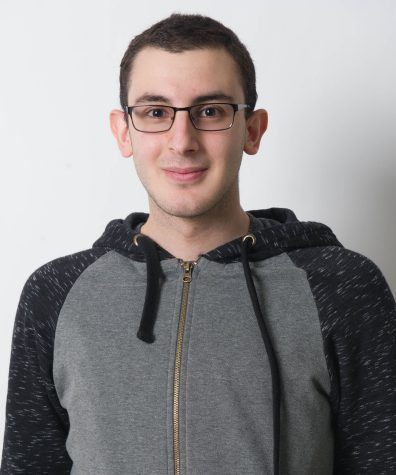Under pressure
Sklarenko and an anonymous senior source shine light on the realities of stress
May 1: National College Decision Day.
May 1-5 and May 8-12: AP Exams.
June 13-15 and June 20-22: Semester Exams.
June 23: Graduation Day for the Class of 2017.
With a whole host of important days approaching in the next two months, many Redondo students are busying themselves by studying for exams, trying to maintain a healthy social life and- especially in the case of seniors- planning their summers. And like many of his students and colleagues, history teacher Nicholas Sklarenko is currently juggling multiple different responsibilities.
“For me personally, it seems like all the things I’m involved with happen at the same time, at this time of year. As an AP teacher, this time of year is definitely very stressful, because I’m trying to get all of my students ready for the AP exam. I do hockey as well, and that takes up a lot of time. I’m doing Model UN, and we have a conference coming up soon. And it’s not just me, it’s everybody. Students and staff alike are involved in so many things and trying to balance all that and everyone is trying to do the best they can in everything that they do,” Sklarenko said.
Sklarenko says that “many students can attest to” his claims when he says that all these time-consuming, practically simultaneous obligations put him in a “very stressful” and physically demanding position.
“It all requires a lot of time and energy. That’s a source of my stress: trying to balance that with living life,” Sklarenko said. “I don’t get as much sleep as I would like. I tend to be a night person anyway, but I feel like when I’m stressed- usually because I’m so busy- I don’t get enough rest as I should. It makes me tired, and I generally just don’t feel as good as I normally would. And if you do that week after week, it takes a physical toll on you.”
Despite this, Sklarenko does not believe his stress hinders his ability to teach his “fantastic” students. However, stress does negatively impact others’ efforts in the classroom. Senior Jane Doe says she felt “a little depressed” at this time last year.
“I had never been that sad before. I felt like a failure, because I had never gotten a C in a class before, and I got a C in AP Chemistry. And I just wanted to sleep all day. I didn’t want to get up in the morning. I purposely missed a lot of school to avoid quizzes and tests, because I was too afraid of getting a bad grade. It’s really hard accepting bad grades, especially if you’re a high-achieving student and you’re not performing very well,” Doe said. “The stress becomes physical at a certain point.”
Thankfully, this current school year has been kinder to Doe. But she claims that efforts by the school administration to encourage healthy lifestyles among those on campus did not help to bring about this positive change.
“I actually feel like they almost add to it all, because they want you to be such a balanced person, they want you to do well in school, they want you to eat healthy and they want you to exercise and play sports. They have to understand that it’s sort of impossible to do that, and then trying to push it all on us can be overwhelming, especially for freshman coming into the school. They think, ‘Let me load up on AP’s and let me play a sport and all that kind of stuff.’ And that’s what I was doing, and it was insane and crazy,” Doe said. “So I think they need to emphasize doing what’s right for you and knowing your limits more.”
Sklarenko’s opinion differs from Doe’s. He feels that it is “really good and important” for the school administration to remind students to try to practice “total wellness.” Junior Ethan Horoschak feels that students remain largely uninfluenced, either positively or negatively, by the occasional emails they receive. He relies on simple things to prevent and relieve stress instead: petting his cat, eating good food, creating a schedule, working out and more.
“The little reminders from the administration are a nice thought, and it shows that they’re considerate,” Horoschak said. “I think they’re just saying ‘Hey, we’re here. We recognize you’re stressed right now,’ but I don’t think the kids are relieved of any stress because of those emails.”
Doe, Sklarenko, and Horoschak all emphasize the importance of friends coping together in trying times. Doe also appreciates the help her family provides her with, and, like Horoschak, values both little pleasures that brighten her day and large-scale planning.
“Stress is definitely preventable. Managing your time is a huge bonus, because if you’re able to manage your time and manage your workload properly, you won’t have stress in the future. Making time for yourself to do something fun on the weekends is also a huge thing,” Doe said. “Sleeping can mitigate stress. Eating right and exercising are huge. Sometimes, my dad would help me get up in the morning by physically dragging me out of bed. And of course, friends can make you forget about all your stresses with laughter.”
Sklarenko ultimately sees fast-paced periods dominated by imminent testing and deadlines as a bonding opportunity for students and staff.
“It builds camaraderie between the students and the teachers, because we’re really all in this together. We all have our days where we’re dragging a little bit and our days where we’re doing good. And so it balances out. In a way, it’s a good experience only in that it’s building relationships within the class even more. Perhaps we can all get a sense of empathy for each other,” Sklarenko said.

I've been on staff since my freshman year ('14-'15), and I mostly write news stories.


